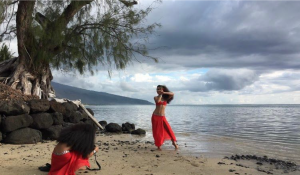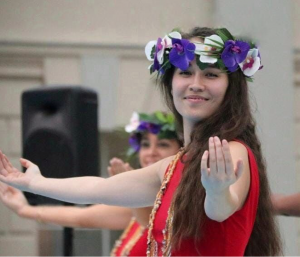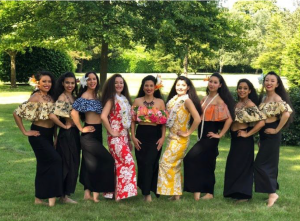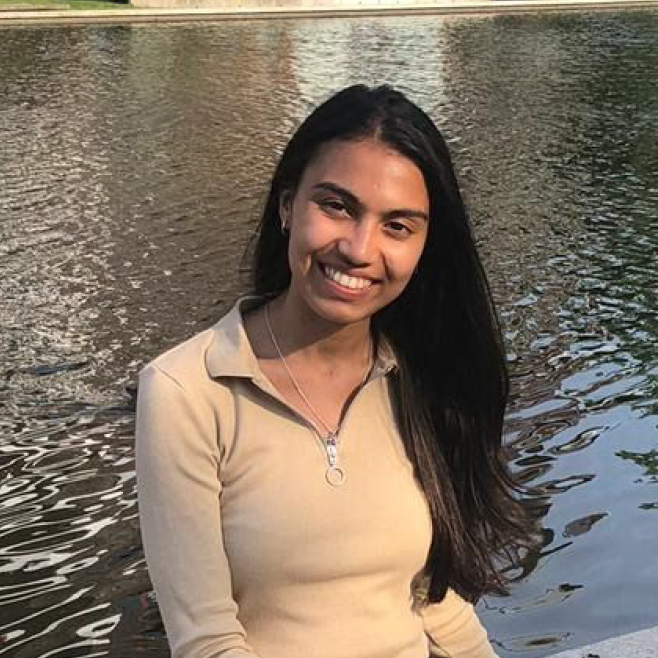By Isabella Lock, freelance journalist and student at University of Manchester studying Spanish and Japanese.

Ori’ dancers taking photos on a beach
Charity work has always been an important part of my life. At the age of 11, I organised a fundraiser at my school. All 120 pupils of my year group participated in my charity walk to raise money for our local charity, Haven House, which supports families looking after children and young people with life-limiting or life-threatening conditions. I had previously taken part in Haven House charity events and wanted to help out more. It was important to me to support the community and give where I can.
Today, I am a regular volunteer at a riding trust for people with special needs. There I volunteer as a side-helper, walking next to the riders for both physical and emotional support. I have grown close to one rider in particular. Although she is 10 years old and I am 19, we grew close as friends, and we always have fun together.
Her big dreams and determination to achieve them inspired me in my own pursuits. When I moved out to university and away from home, I had to say goodbye to my friend. Whenever I come back home, I visit the riding trust and catch up with the rider and other volunteers. I have found volunteer work highly rewarding. It always leaves me feeling happy, inspired, and grateful for life.
Besides fundraising and volunteering, I also dance Ori’, a traditional dance originating from Tahiti, Polynesia.
Ori’ dance origins
Ori’ dance was an important part of life in ancient Tahiti and was often performed in religious ceremonies, social gatherings, and everyday life. It was used by the Tahitian people to pass down traditions to younger generations so that they can tell the stories of their ancestors. Each individual dance tells a story through hip movements and hand motions.
Within Ori’ dance, there are different types of dance. At my dance school, we perform ‘ōte’a and ‘aparima. While the former consists of faster hip movements and less focus on the hands, the latter tells the story predominantly through hand motions (the word ‘rima’ translates into ‘hands’).
This is my dance school’s 3rd Place Mehura (‘aparima) for the Ori Tahiti Nui competition in Tahiti 2019.
I began Ori’ dance almost three years ago. Growing up, my grandfather often played Polynesian music. As a little girl, I loved listening to the music and asked my grandfather where it came from. He explained that it was from Polynesia and showed me videos of Polynesian dance. I fell in love with the beautiful costumes and the elegance of the dance. Unfortunately, Ori’ dance isn’t popular here in the UK, and so I was unable to find any dance schools to learn the dance myself.
In 2017, I discovered London School of Hula and Ori’ (LSHO), which was holding dance classes at Pineapple Studios in London. I decided to give it a shot and the rest is history. I have found a love for a culture on another island across the world. More importantly, I have made wonderful friends with fellow dancers, who always inspire and support me.
Learning and respecting the culture

Ori’ dancer from my dance school
During my time dancing Ori’, I have performed at various cultural events to offer others an insight into Tahitian culture through music and dance. This is reflective of CCF’s first principle in relation to opening the conversation about culture and race. It is in my dance school’s ethos to build a community of culturally aware and technically trained dancers to effectively represent Ori’ dance in the United Kingdom.
Although we are a small community of Ori’ dancers in the UK, we are growing. When I joined three years ago, the classes were smaller and there was no website for people to look up. Today LSHO welcomes people from all over the world to dance with us via Zoom. All those who join, whether it be their first or 1000th class, is welcomed and supported as any other dance is.
Being mixed race, I have discovered the importance of culture. Growing up, I often struggled to fit into any one community since my cultural background is so mixed and unique. I have learnt to embrace all my wonderful cultures and belong to all communities. I believe that culture does not run through blood, but through the soul. My dream in life is to embrace every culture in the world and walk in the footsteps of every stranger. When I dance Ori’, I stand in the shoes of an ancient Tahitian telling the story of their ancestors. I feel a great sense of gratitude that I have been given this opportunity by the Tahitian people and I feel that it is my responsibility to share this culture in the most effective and respectful manner.
And while it is important to open the conversation about Tahitian culture with non-Tahitians, I feel that it is unfair that Ori’ dancers often perform at cultural events for free.
Between rehearsing, costume-making, and organising all individuals involved, performances cost a lot of our time.
Krysten Resnick, founder and director of London School of Ori’ and Hula, shares that it takes a lot of time to put on a show, such as “making the costumes, cleaning the costumes, carrying the costumes — and that’s just costumes.” She goes on to state that “if you’re asking me for my time, you’re asking me for my money.”
I have witnessed the amount of time and commitment that Krysten puts into LSHO, for which I have great respect. I, too, have spent hours making costumes and running through the same dance until perfect — but my individual work only scrapes the surface of the entirety of LSHO’s hard work. To not pay LSHO for their hard work is disrespectful and exploitative. This directly relates to CCF’s fifth principle, which stresses that time is equal to money.
Krysten also explained that when LSHO was offered its first performance opportunity, she felt that she had to take it to “get their foot in the door” despite the work being unpaid. Since Ori’ dance is not very well-known in the UK, every opportunity is important to share the wonderful culture.
In my opinion, I often feel that there is a difficult balance of wanting to share our passion for Ori’ dance to others, whilst also being respected for our hard work. As LSHO grows, I believe that organisations will begin to recognise the amount of time and money that goes into our performances and pay us respectfully.
Community and belonging

My dance community
When I think about the Ori’ community, I think of family. Although we are all individual dancers, we move together as one. Without one dancer, we are incomplete.
A perfect example of this is the preparation before a show. We all run around the dressing room, grabbing hair brushes, finding our costumes, and practising our dances. Most importantly, we run around helping each other.
From brushing another dancer’s hair to putting fake lashes on another, we must all work together as a team and ensure that we are all ready to perform. Sometimes people get angry and stressed out but, like a family, we brush it off and move forward knowing that we all still love and support one another.
I remember for one performance we had to practise the same dance over and over again outside in the suffocating heat of London. At the time, I was fed up and annoyed at my dance teacher for making us repeat it many times.
Now, during lockdown when we cannot perform together at shows, I miss it. I miss the stress and panic of shows. I miss the support and love among the dancers before we walk out on a stage. We are all in it together to tell the audience a story originating from the island of Tahiti across the world from the UK. Everyone has a role in our Ori’ family and so everyone belongs, which relates to CCF’s seventh principle of belonging.
The Ori’ community welcomes all, no matter your background, ability, or age. Each dancer, from beginner to professional, is embraced and supported. We help each other grow as dancers and as people to create a safe space to learn about Tahitian culture.
During my time dancing Ori’, I have often made cultural mistakes. For example, I have called dance moves by the wrong name or performed them incorrectly. However, my dance sisters are happy to correct me in a respectful and kind manner. In this way, I feel both valued and safe in the Ori’ community as I try my best to learn and improve as a dancer.
CCF’s third principle states that nonprofits must not treat one another as competitors but as critical partners with the same goal of strengthening the community. This represents the Ori’ community. While competition is a big aspect of the Ori’ dance world, we all have the same goal of strengthening the community and spreading Ori’ dance across the world.
Under lockdown, Ori’ dance champion, Tehani Robinson, set up Amui’ Tatou’, a series of Ori’ workshops held via Zoom, in which all proceeds went to a charity of choice. From all over the world, top Ori’ dancers, such as Hinatea Colombani and Jesy Muñoz, shared their knowledge and expertise on Ori’ dance. The ambience of the workshops was not of competition, but rather of supporting each other in our journey of strengthening both the community and ourselves as dancers. In this way, we can effectively share the culture together and invite others to join us.
CCF’s tenth principle recognises the importance of healing and liberation. Beyond learning about the rich culture of Tahiti and educating others, dancing Ori’ offers a safe space to express oneself. It can heal the soul when feeling emotionally drained or disconnected from the world. To all those who fight for justice, I encourage you to try Ori’ dance to nourish both your soul and body.

Isabella Lock
Isabella Lock (she/her) is a freelance journalist and student at the University of Manchester studying Spanish and Japanese. She regularly writes for her blog and The Mancunion. All of Isabella’s published work can be found in her portfolio. She can be reached on Twitter at @isabellalock_, on Instagram at @isabellalock_, or via email at isabella174@btinternet.com.
Discover more from CCF
Subscribe to get the latest posts sent to your email.
